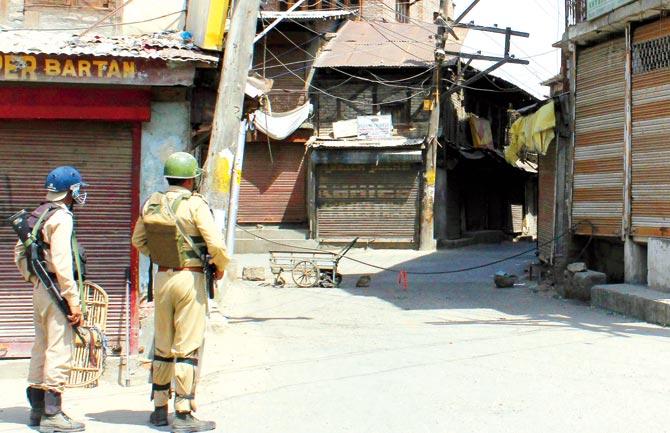The BJP's 'all muscle, no brain' policy towards Kashmir and Pakistan may finally have thawed, with renewed efforts at peace talks


The Ramzan ceasefire in the Valley, though cosmetic in nature, does give Kashmiris a hope of peace. File pic
 At the launch of my book The Spy Chronicles: RAW, ISI and the Illusion of Peace in Delhi on Wednesday, former Union Finance Minister Yashwant Sinha characterised Prime Minister Narendra Modi's approach to Kashmiris' political grievances as a "muscular policy, which is a brainless policy". Sinha has been sharply critical of Modi since last September, when he criticised the government's economic policies and programmes; he has regularly visited Kashmir since September 2016, post the Burhan Wani violence in the Valley.
At the launch of my book The Spy Chronicles: RAW, ISI and the Illusion of Peace in Delhi on Wednesday, former Union Finance Minister Yashwant Sinha characterised Prime Minister Narendra Modi's approach to Kashmiris' political grievances as a "muscular policy, which is a brainless policy". Sinha has been sharply critical of Modi since last September, when he criticised the government's economic policies and programmes; he has regularly visited Kashmir since September 2016, post the Burhan Wani violence in the Valley.
ADVERTISEMENT
Last month, he resigned from the BJP. I agree with him — and I'm not alone. Our army chief has said there are limits to a muscular policy; that fighting militants and terrorists are a part of the job, but beyond that it is up to the State to talk and resolve society's grievances. The saddest part of it, Sinha added, was that the rest of India wasn't particularly bothered: "We are morally dead as a country," he said. One person who has woken up is Union Home Minister Rajnath Singh. He made significant statements on Saturday regarding J&K.
One, he told a TV channel that the government was ready to talk to the Kashmiri separatists known as the All Parties Hurriyat Conference: "If Hurriyat is ready to talk, we have no problem, we are ready to talk to anyone." Two, he said he said India was not averse to talks with Pakistan: "If Pakistan is ready to talk, why won't we talk? We want to have good relations with our neighbour. But even the neighbour will have to take some initiative," he told a newspaper. These are departures from the Modi government approach over the past four years. Just a month back, BJP general secretary Ram Madhav on social media reiterated the Centre would not budge from not talking to separatists and to those not "loyal to India".
On May 19, when Modi visited Srinagar he did not mention talks but asserted that "every issue, every problem has one solution: development, development and development". And the special interlocutor that the Centre appointed last October, former Intelligence Bureau (IB) director Dineshwar Sharma, to talk to all sections in Kashmir, has made zero progress. On Pakistan, there is no dialogue between the two countries. There has been the theatricality of Modi inviting former Prime Minister Nawaz Sharif for his swearing in, or of Modi suddenly landing up in Raiwind on December 25, 2015, for Sharif's granddaughter's wedding. The foreign offices haven't interacted. "It's strange that we talk to China, with whom we keep having border incidents, five times a year, but we never talk to Pakistan," former National Security Advisor Shiv Shankar Menon said at the book launch. Rajnath's statements therefore mean a breakthrough is imminent.
And none too soon. Leading up to this was the Centre's declaration of a Ramzan ceasefire in the Valley; it followed a suggestion by J&K Chief Minister Mehbooba Mufti. Though cosmetic in nature, it does give Kashmiris hope of peace. Rajnath also held a two-day National Security Strategies Conference last week, organised by the IB and attended by senior security officials from across India, who recommended that the Hurriyat be engaged with. (Incidentally, news reports state that Rajnath rebuked officials who derisively joked about Hurriyat leaders feeding traditional Kashmiri delicacies to the Rohingyas. In a newspaper interview, he also rebuked TV news channels for demonising Kashmiris.) The real starting point for this was the two-day informal summit between Modi and Chinese President Xi Jinping in Wuhan, central China, one month ago.
"It is inconceivable that the two spoke for nine hours and that Pakistan did not come up," said one diplomacy analyst. China had apparently pointed out to Modi that the Pakistan army chief, General Qamar Javed Bajwa, made two statements in favour of talks with India during the past six months: on December 19, 2017, he briefed Pakistan's Senate and said, "if the government decides to hold talks with India, then the army would back the government"; and last month he said that the only way for a peaceful resolution to India-Pakistan disputes is a "comprehensive and meaningful dialogue". At the book launch, one of my co-authors and former Research and Analysis Wing (RAW) chief AS Dulat even suggested that India "roll out the red carpet" for General Bajwa. (The other co-author is former ISI chief General Asad Durrani.)
He said, echoing the approach followed by former PM AB Vajpayee, that we ought to talk to Pakistan, and we ought to talk to Kashmiris as well. Following the informal summit in China, India's and Pakistan's NSAs have been in touch to follow up on getting bilateral talks started again. Rajnath Singh's statements indicate that things are shaping up and something concrete could emerge soon. After a Ramzan ceasefire, that would be the best Eid gift of all.
Aditya's latest book, The Spy Chronicles: RAW, ISI and the Illusion of Peace, co-written with AS Dulat and Asad Durrani, is now available. He tweets @autumnshade Send your feedback to mailbag@mid-day.com
Catch up on all the latest Crime, National, International and Hatke news here. Also download the new mid-day Android and iOS apps to get latest updates
 Subscribe today by clicking the link and stay updated with the latest news!" Click here!
Subscribe today by clicking the link and stay updated with the latest news!" Click here!







